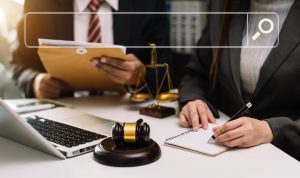 Social media’s here to stay. Millions of people flock to platforms like Facebook, Twitter, Instagram, and Snapchat to share details of their lives with their friends and loved ones. It’s also brought about an era of what might be considered oversharing, as people share intimate details of their lives without considering who may be out there reading it. That’s especially true for people who are injured in accidents and have injury claims or personal injury lawsuits.
Social media’s here to stay. Millions of people flock to platforms like Facebook, Twitter, Instagram, and Snapchat to share details of their lives with their friends and loved ones. It’s also brought about an era of what might be considered oversharing, as people share intimate details of their lives without considering who may be out there reading it. That’s especially true for people who are injured in accidents and have injury claims or personal injury lawsuits.
Why can posting on social media after an accident hurt your case? Because insurance companies and opposing attorneys could be looking at your social media accounts for anything that undercuts your story. If you’re contending that an accident caused you to be seriously injured and you post photos of yourself out on the town or taking part in physical activities, you could give them the ammunition they need to deny your claim or rebut you in court.
The Dangers of Using Social Media
While we’ve been conditioned to think of social media as an extension of our personal lives, these accounts are ultimately owned and run by large corporations. How they handle that information is largely outside of our control – and once social media posts go public, they can’t be taken back. Even though you can delete posts after they’re up, there’s nothing to stop people from taking screenshots of what’s been posted while they’re live or from digging through server archives. An old post can still come back to haunt you even if you think you’ve scrubbed it.
Social media posts also typically are stamped with dates and times automatically. That’s great if you’re trying to remember the good times you had and the milestones you’ve passed. When it comes to legal cases, however, these timestamps can make it easy for investigators to piece together timelines. If you’re a person who posts a lot, you may have inadvertently left a breadcrumb trail of evidence.
How the Other Side Might Use Social Media Against You
Cases can and sometimes do hinge on what a plaintiff reveals in social media posts. As the American Bar Association notes, “Courts have allowed discovery of social media information when litigants can show its relevance to the case.” It then cited a case in New York, where a basketball player contended that he was disabled in a car accident.
However, his social media accounts showed evidence of physical activity following the date of the accident. In that case, “The court held that access to private social media accounts was permitted to obtain information such as photographs and other evidence of physical activity.” While the court established limitations on what could be used, his social media posts contained the evidence needed to contradict his claims.
Moreover, passively collected electronic information can also potentially be used against you. In one Nevada case, a woman claimed that she suffered a fall at a restaurant that necessitated surgery. The restaurant’s lawyers requested information from her fitness tracker be brought into evidence to show whether the plaintiff could maintain her activity level following the accident. In that case, the plaintiff was merely wearing a watch and moving around, which the court allowed to be submitted as evidence.
What to Do (and Not Do)
 The things you post to social media after an injury can affect your ability to get the compensation you deserve. Here are some important do’s and don’t’s to consider:
The things you post to social media after an injury can affect your ability to get the compensation you deserve. Here are some important do’s and don’t’s to consider:
- Don’t post anything about the accident or your injury on social media
- Do check your accounts’ privacy settings and think about temporarily deleting your accounts while your claim or case is pending
- Don’t post new photos of yourself to your accounts, as these photos can undercut your claims
- Do ask your friends to refrain from posting photos of you or information about your injury
- Don’t accept new friend requests, particularly from those you don’t already know
- Do discuss your case with an attorney as soon as possible
How to Get Started
If you’ve been hurt in an accident and want to pursue compensation from the person responsible, contact a Chicago personal injury lawyer at Karlin, Fleisher & Falkenberg, LLC online, or by calling 312-346-8620.
We’ve recovered more than $400 million in settlements and verdicts to date on behalf of our clients and have the skill and the resources to help you demand the money you may be owed. We look forward to meeting you, answering your questions, and discussing your options during a free initial consultation.
